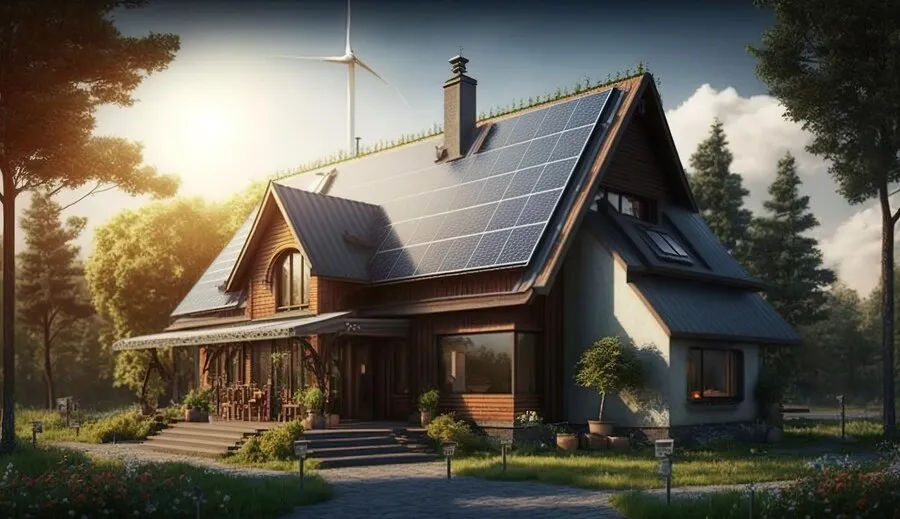Key Takeaways:
- Understanding the environmental and economic benefits of residential solar energy.
- An overview of the installation process and maintenance of solar panels.
- Insight into the reliability and efficiency of solar energy and the impact of solar batteries.
- Real-world examples highlight the personal and community benefits of adopting solar power.
Understanding Solar Energy for Residential Use
The transition to solar energy can revolutionize how your home operates, offering a cleaner, renewable energy source that is increasingly becoming more accessible. Solar energy harnesses photovoltaic (PV) technology, where PV cells within solar panels convert sunlight directly into electricity. This process involves the creation of an electrical current when the solar cells are exposed to sunlight, a principle known as the photovoltaic effect. Solar panels, mounting gear, an inverter (which converts DC electricity to AC electricity), and occasionally a solar battery for energy storage are the standard components of a residential solar setup. Opting for solar energy at home involves assessing your rooftop’s suitability, understanding the system’s capacity you’ll need based on electricity consumption, and learning the basics of how your system will operate within the broader energy ecosystem.
The Environmental Impact of Switching to Solar
Turning to solar energy is a tangible action homeowners can take to contribute to global efforts to combat climate change. Solar power systems generate clean, renewable energy from the sun, which helps to conserve nonrenewable fossil fuels and reduce greenhouse gas emissions. Notably, the average residential solar energy panel system can significantly offset your carbon footprint, equivalent to planting over a hundred trees annually. Furthermore, the move away from fossil fuels also curtails other pollutants affecting air and water quality, contributing to a healthier environment and populace. Solar homeowners can substantially facilitate a greener future by reducing the demand for energy from power plants.
Economic Advantages of Solar Power at Home
While the environmental incentives are compelling, the economic advantages of solar energy also strongly influence homeowner decisions. After the initial setup, solar panels can cut your monthly electricity bills by a significant margin as they generate free power for the system’s entire 25+ year lifecycle. Areas with high electricity rates and suitable solar conditions can expect even more significant savings. Furthermore, many governments worldwide offer tax credits, rebates, and other incentives to make installing solar panels more affordable.
Solar Energy Reliability and Efficiency
The worry of intermittent power, traditionally a concern with renewable energy, is becoming less pertinent due to advancements in solar technology. The efficiency of modern solar panels has improved substantially, with many panels now converting 15% to 20% of sunlight into electricity and some premium panels exceeding those rates. Alongside improving individual panel performance, the proliferation of micro-inverter technology, where each panel operates independently, increases overall system efficiency by mitigating the effects of shading or a malfunction in a single panel. The efficiency and reliability of solar power are further underscored by the growth of solar energy facilities worldwide, demonstrating the technology’s ability to stand on par with traditional energy sources. This growth indicates solar power’s emergence as a mainstream energy solution, robust enough to serve individual homes and entire communities.
Maintenance and Longevity of Solar Panels
Concerns about the maintenance requirements of solar energy systems are shared among prospective adopters, but fortunately, solar panels are remarkably low-maintenance. After installation, they only need to be cleaned regularly to get rid of any dirt or debris that may have accumulated and occasionally checked to ensure all the pieces are firmly fastened and functioning correctly. You can expect your solar power system to provide clean energy for decades, with many systems functioning efficiently after their expired warranty period. The robustness and durability make solar panels a wise choice for a long-term investment in sustainable energy.

Jasper Bruxner is a passionate and versatile blogger with a keen eye for trends and a knack for crafting engaging content. As the founder of WendyWaldman, he has established himself as a trusted resource in a diverse range of niches, including food, tech, health, travel, business, lifestyle, and news. He tends to share the latest tech news, trends, and updates with the community built around Wendywaldman. His expertise and engaging writing style have attracted a loyal following, making him a respected voice in the online community.




